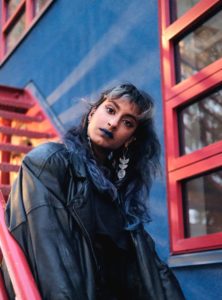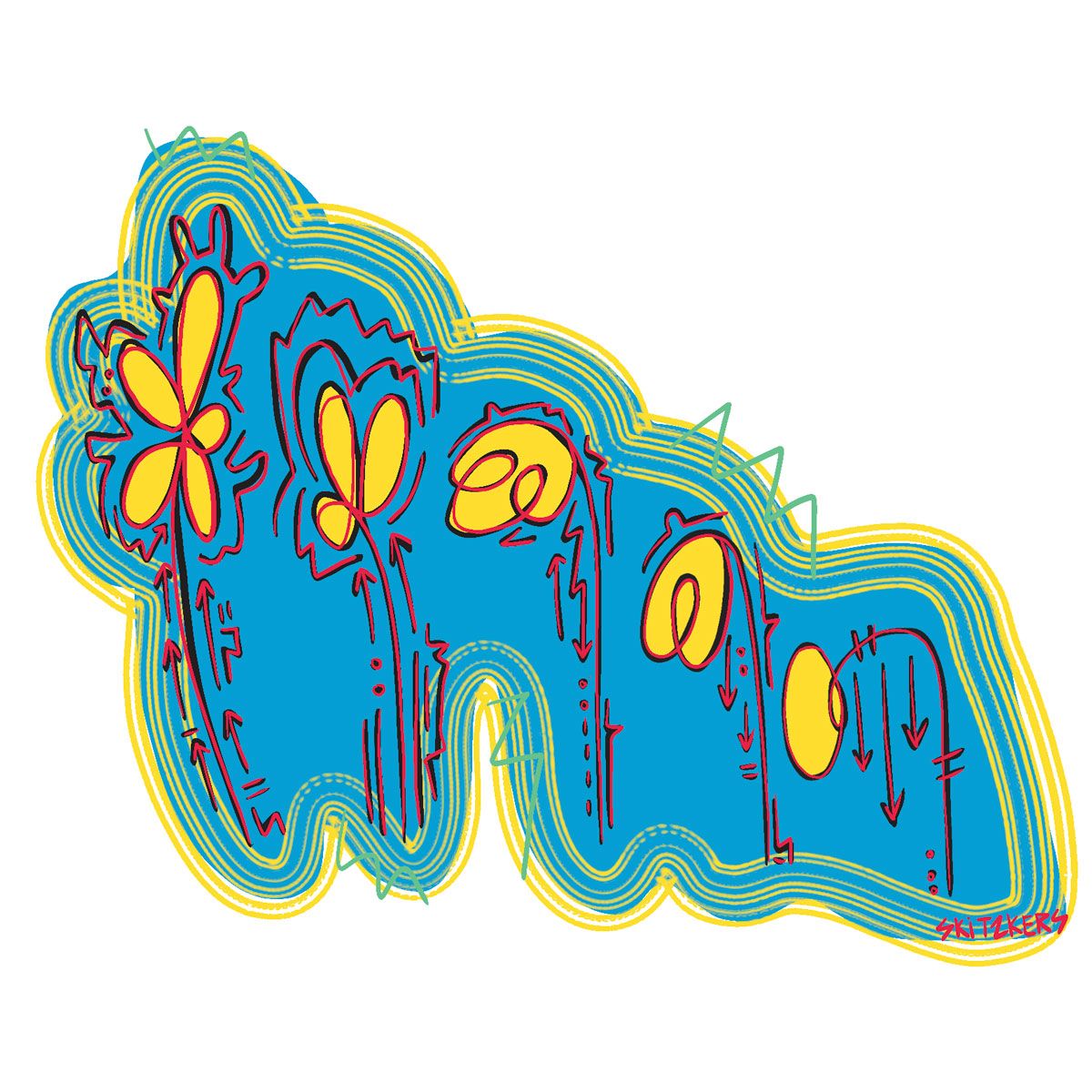I met with Franz at Upstart & Crow: Literary Arts Studio, a local bookstore located on Granville Island. It was a late afternoon on a typical rainy day in Vancouver. At 6pm, most of the stores in the neighborhood were already closing for the day. The only places left open were the restaurants and bars. As I turned at the next intersection, across from the quiet empty streets, the lights from Upstart & Crow were shining right through, “Open,” the sign reads, still hanging on the door.
In addition to being the founder of Enable: Arts Society, Franz also works part-time at this bookstore. Franz just recently graduated from Kwantlen Polytechnic University (KPU), where she earned her bachelor of arts in creative writing.
I push open the door. The bookstore feels very homey, artsy, and welcoming. The wooden shelves are lined up side-by-side, a wooden ladder propped up against one of the shelves to break the monotony. There is a variety of book genres, creating a symphony of colors — the rosy red, golden yellow and forest green. At the center of the store were three rectangular wooden tables, on them were some featured books, perfume bottles, stationery and homewares.

We sit on the black leather couch at the back of the store. Franz is wearing an oversized button-up, with blue and green highlights in her hair, turquoise green nails. One of her arms is covered in tattoos — an open skull with a heart inside, a ghost flying off with a balloon, a bumblebee, a vampire lip bite, to name a few. “Almost every tattoo caused a fight with my mom,” Franz explained, “but they are too important to me to stop getting them.” Tattoos allowed her to find a place to belong, and to control how other people see her. “And yes, I’m going to get more,” Franz added resolutely.
Franz exudes a sense of confidence and a hint of rebelliousness, whether it be in her fashion or her poetry. When asked to describe her style of writing, Franz replies: “Confessional and multi-genre,” and I agreed. Her poem, “OKAY” starts off “Rain is a pain/ My brain can’t/ sustain the serotonin to be ok…”. The emotionally charged confessional continues, “I wake up with a pain/between my shoulder blade and ribcage”. Writing, to her, is an inherently vulnerable process. It is an activity that allows one to explore past traumas, to revisit and heal wounds.
Growing up in a relatively strict Catholic School in Surrey, Franz was never given the space to express herself. “It was a lot of suppression,” Franz sighed. At school, Franz had to wear a uniform and oblige traditional social standards. At home, her love for the arts and writing wasn’t initially encouraged as a professional pursuit. Living in the diaspora, Franz feels estranged from her heritage —“The children of immigrants are trying/ to learn their culture from textbooks,” she writes in “Displaced in a Classroom.” In the poem “Bare,” Franz opens with a recollection of her Catholic School days, confronting an extra layer of colonization in her family’s long Catholic history, tracing back to the Portuguese and British era — “Legs crossed on a Catholic classroom carpet / My tunic doesn’t hide whole thighs / in the springtime socks knee-high.” Franz explained that it is a slow and gradual process of unlearning and relearning to embrace her own identity.
There’s a strong sense of embodiment in Franz’ work, “I’m fascinated by the mind and the body, of how the body is the medium for all our encounters with the external world,” Franz expressed during our interview. Her workshop, “A practice: play, poetry, pranayama” focuses on writing and embodiment, and begins with mindfulness practices which invite one to be present in their body and to let go of all worries. What follows is a non-judgmental exercise, of which the participants are asked to simply let ideas generate, and to not judge the content of those ideas as they surface. Franz finds that a mindfulness practice helps writers concentrate better during their own process.

There’s another way in which Franz embodies her work, in a more literal sense: performing. Poetry not only lives on the two-dimensional sheet of paper — in between the black strokes and the imposing white spaces — to Franz, poetry is inscribed in and transformed through the poets’ very own bodies in the verbal utterance, the hand gestures, the waving and the dancing. In a recorded performance of “Displaced in a Classroom,” Franz stands on a patch of green grass, overlooking the shoreline. As she read out in a wresting tone, “I am too tired to change / baggy sweat pants and an oversized jacket,” Franz swings back and forth. With her hand slightly tilted, she swirls and swirls as she hits the ground. The distress the poem intends to communicate is magnified by the bodily performance. When asked how she decides which poetry to perform at an event, Franz explained that right now she has two to three pieces memorized, “depending on how long my segment is, my mood that day, and the audience response, I decide in the moment ” A performance is multi-faceted: it is at once an interplay between the poem itself and the poet, and one between the poet and their audience. In this way, Franz’ performances are dynamic, intentional, and impactful.
This is not to neglect the written forms of poetry. Franz likes to experiment with form in her work. In “Bare” the top half of the text is aligned to the left of the page, while the bottom half is aligned to the right. Transitioning from the top to bottom are two longer sentences that overlap at the very center of the page. I asked her during the interview about this layout, and Franz explained, “The top half was writing about my elementary school days, and the bottom half about my high school days. The middle two sentences overlap to show the connection between these two stages of my life — of a continued journey of uncovering my identity amidst the noise and suppression.” In a different work, “Avril 14th” Franz had the poem divided into three vertical columns. The first line “You send me a song,” is aligned to the left, the second line, “of falling” is at the center, and the third line, “in love” is to the right. Combining these three lines — visually — this first sentence “You send me a song of falling in love” is indeed descending on paper.

What’s next? Enable: Arts Society is hoping to get a sound installation and a performance project off the ground in 2022, and Franz will be performing at Mashed Poetics this November. She also hopes to finish her novel in a year.
Franz tells me “I’m learning how to create from joy, but I need to resolve the trauma first,” she pauses, “Eventually there will be happier stories.” In writing stories inspired by childhood trauma, Franz gives a voice and reassurance to others in situations similar to hers, “What were the things my13 or 17-year-old self needed to hear?” she explains. In helping herself, Franz also hopes to help other people, “I hope my story can meet others, amidst theirs.” I look forward to seeing what Franz’s next chapter will look like too.
As I leave the bookstore — the skyline much darker and the streets quieter than when I got here — the lights are still beaming from Upstart & Crow: Literary Arts Studio, in fact, brighter than ever. Franz’s sense of confidence, with a hint of rebelliousness, still lingers on my mind.


